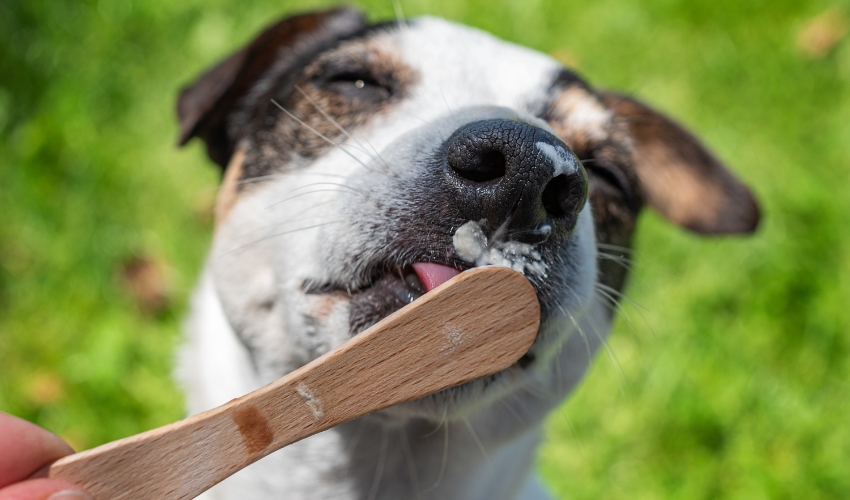Dogs are beloved pets around the world, with their goofy personalities and loyalty to their owners. But as much as we adore them, we can’t deny that sometimes they let out some unpleasant smells. Dog farts can be a nuisance but also a natural bodily function. Perhaps you’re reading this blog with the same question in mind: why does my dog fart so much? This blog post will discuss the reasons behind this stinky issue.
What’s Normal?
Firstly, it’s important to understand that flatulence is normal in dogs, just like in humans. The average dog passes gas between 5 and 15 times daily, depending on their diet and other factors. It’s a natural process that occurs when bacteria in the gut break down food, which produces gas as a byproduct. The gas must then be expelled from the body through burping or farting.
Why Dogs Fart So Much
Diet
One of the main reasons why dogs fart so much is their diet. A dog’s digestive system is designed to digest and process meat, which means their diet should consist of high-quality protein sources. However, some dog foods contain ingredients difficult for dogs to digest, such as grains, dairy, and soy. When a dog eats these types of foods, it can cause gastrointestinal issues, including excessive gas. This is especially true for dogs with sensitive stomachs or food allergies.
Eating Habits
Another factor that can contribute to a dog’s flatulence is their eating habits. If a dog eats too quickly, they may swallow a lot of air, which can lead to more farting. This is more common in dogs fed from a raised bowl or eating too quickly because they feel like they have to compete with other dogs for food. To reduce the air a dog swallows, try feeding them smaller portions throughout the day or using a slow-feed bowl.
Breeds
Certain breeds of dogs are also more prone to flatulence than others. Brachycephalic breeds, such as Bulldogs, Pugs, and Boxers, are more likely to fart because they have shorter snouts and tend to gulp air when they eat. Similarly, larger breeds of dogs, such as Great Danes and Mastiffs, may have more gas because they have larger digestive tracts. While breed does play a role in a dog’s likelihood to fart, it’s important to note that any dog can develop flatulence, regardless of breed or size.
Medical Conditions
Lastly, medical conditions can also contribute to a dog’s excessive flatulence. If a dog has a gastrointestinal issue, such as irritable bowel syndrome or inflammatory bowel disease, it can cause them to fart more frequently. These conditions can be managed with dietary changes and medication, so it’s important to talk to your veterinarian if you suspect your dog may have an underlying medical issue.
How to Reduce Your Dog’s Flatulence
Making dietary changes is one of the easiest ways to combat excessive farting. Look for high-quality dog foods that are free from fillers and difficult-to-digest ingredients, such as grains and dairy. You can also try adding probiotics or digestive enzymes to your dog’s food, which can help to improve their gut health and reduce flatulence. Additionally, you can feed your dog smaller meals throughout the day or use a slow-feed bowl to reduce the amount of air they swallow while eating.
Another way to combat dog farts is to encourage more physical activity. Exercise can help improve your dog’s digestion and overall health, leading to less flatulence. Regular walks, trips to the park, or even playing fetch in the backyard can all help to reduce your dog’s farting.
When to Worry

While flatulence is a normal bodily function in dogs, excessive farting can sometimes indicate an underlying issue. Here are some signs to watch out for that may indicate your dog’s excessive farting is cause for concern:
- Changes in the smell or frequency of farting: If you notice a sudden change in the smell or frequency of your dog’s farts, it may indicate an issue with their diet or gastrointestinal tract.
- Abdominal pain or discomfort: If your dog is experiencing abdominal pain or discomfort, they may be farting more than usual as a result.
- Changes in bowel movements: If your dog is farting more than usual and is also experiencing changes in their bowel movements, such as diarrhea or constipation, it may indicate an issue with their digestive system.
- Loss of appetite or weight loss: If your dog is farting more than usual and experiencing a loss of appetite or weight loss, it may indicate an underlying medical condition, such as a gastrointestinal issue or infection.
- Excessive lethargy or lack of energy: If your dog is farting more than usual and seems excessively lethargic or lacks energy, it may indicate an underlying medical condition requiring veterinary attention.
If you notice any of these signs in your dog, it’s important to consult with your veterinarian to rule out any underlying medical conditions. Your veterinarian may recommend dietary changes, medication, or further testing to identify and treat the underlying issue.
Closing Words
In general, if your dog is farting more than usual but is otherwise healthy and active, it may not be cause for concern. The excessive flatulence may only be due to air they have swallowed while eating. However, if you’re unsure or concerned about your dog’s excessive flatulence, it’s always best to consult your veterinarian to ensure their health and well-being.











